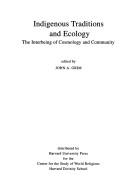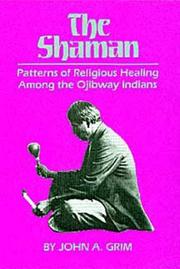| Listing 1 - 10 of 21 | << page >> |
Sort by
|

ISBN: 0945454279 0945454287 9780945454274 9780945454281 Year: 2001 Publisher: Cambridge (Mass.): Harvard university press,
Abstract | Keywords | Export | Availability | Bookmark
 Loading...
Loading...Choose an application
- Reference Manager
- EndNote
- RefWorks (Direct export to RefWorks)
A new perspective on religions and the environment emerges from this collection. The authors, a diverse group of indigenous and non-native scholars and environmental activists, address compelling and urgent questions facing indigenous communities as they struggle with threats to their own sovereignty, increased market and media globalization, and the conservation of endangered bioregions. Drawing attention to the pressures threatening indigenous peoples and ways of life, this volume describes modes of resistance and regeneration by which communities maintain a spiritual balance with larger cosmological forces while creatively accommodating current environmental, social, economic, and political changes.
Indigenous peoples --- Ethnophilosophy --- Cosmology --- Environmental degradation --- Environmental ethics --- Religion --- Ecology --- Religious aspects --- Cosmology. --- Environmental ethics. --- Ethnophilosophy. --- Religious aspects. --- Ecology. --- Religion. --- Indigenous peoples - Religion --- Indigenous peoples - Ecology --- Environmental degradation - Religious aspects

ISBN: 0806118091 0806121068 Year: 1983 Publisher: Norman, Okla. University of Oklahoma Press
Abstract | Keywords | Export | Availability | Bookmark
 Loading...
Loading...Choose an application
- Reference Manager
- EndNote
- RefWorks (Direct export to RefWorks)
Comparative religion --- shamanism --- Ojibwa [culture or style]
Book
Year: 1983 Publisher: Norman University of Oklahoma Press
Abstract | Keywords | Export | Availability | Bookmark
 Loading...
Loading...Choose an application
- Reference Manager
- EndNote
- RefWorks (Direct export to RefWorks)
Book
ISBN: 9781610912358 1610912357 9781597267076 1597267074 9781597267083 1597267082 1941821626 9781941821626 Year: 2013 Publisher: [Place of publication not identified] Island Press
Abstract | Keywords | Export | Availability | Bookmark
 Loading...
Loading...Choose an application
- Reference Manager
- EndNote
- RefWorks (Direct export to RefWorks)
Book
ISBN: 2266048481 Year: 1993 Publisher: [Paris] : Presses Pocket,
Abstract | Keywords | Export | Availability | Bookmark
 Loading...
Loading...Choose an application
- Reference Manager
- EndNote
- RefWorks (Direct export to RefWorks)
C'est aux sources du chamanisme que nous avons puisé des techniques dites supranaturelles. Au sein de certaines sociétés amérindiennes du Nord, le chamane jouait le rôle d'intermédiaire entre la terre et le cosmos avec lequel il communiquait dans un jeu subtil de visions, de rêves et de rituels de revitalisation. Au-delà de l'anthropologie, l'auteur nous montre ici les implications personnelles et transpersonnelles du pouvoir spirituel de guérison vécu comme énergie nourricière de la communauté et nous permet un autre regard sur les forces invisibles qui nous gouvernent.
Chamans --- Chamanisme.
Book
ISBN: 1783748052 1783748044 1783748036 9791036560781 Year: 2020 Publisher: Cambridge, England : Open Book Publishers,
Abstract | Keywords | Export | Availability | Bookmark
 Loading...
Loading...Choose an application
- Reference Manager
- EndNote
- RefWorks (Direct export to RefWorks)
This book is a celebretion of the diversity of ways in which humans can relate to the world around them, and an invitation to its readers to partake in planetary coexistence. Innovative, informative, and highly accessible, this interdisciplinary anthology brings together scholars and educators across the sciences and humanities, in a collaborative effort to illuminate the different ways of being in the world and the different kinds of knowledge they entail – from the ecological knowledge of indigenous communities, to the scientific knowledge of a biologist, and the embodied knowledge communicated through storytelling. This anthology examines the interplay between Nature and Culture in the setting of our current age of ecological crisis, stressing the importance of addressing these ecological crises occurring around the planet through multiple perspectives. These perspectives are exemplified through diverse case studies – from the political and ethical implications of thinking with forests, to the capacity of storytelling to motivate action, to the worldview of the Indigenous Okanogan community in British Columbia. Living Earth Community is essential reading not only for researchers and students, but for anyone interested in the ways humans interact with the community of life on Earth, especially during this current period of environmental emergency. As with all Open Book publications, this entire book is available to read for free on the publisher’s website. Printed and digital editions, together with supplementary digital material, can also be found at www.openbookpublishers.com
Human ecology. --- Ecology --- Environment, Human --- Human beings --- Human environment --- Ecological engineering --- Human geography --- Nature --- Social aspects --- Effect of environment on --- Effect of human beings on
Book
ISBN: 1608336530 9781608336531 9781626980952 1626980950 Year: 2014 Publisher: Maryknoll, New York
Abstract | Keywords | Export | Availability | Bookmark
 Loading...
Loading...Choose an application
- Reference Manager
- EndNote
- RefWorks (Direct export to RefWorks)
Thomas Berry (1914-2009), was a priest, a'geologian,'and a historian of religions. He was an early and significant voice awakening religious sensibilities to the environmental crisis. He is particularly well-known for articulating a'universe story'that explores the world-changing implications of contemporary science. Berry pointed the way to an ecological spirituality attuned to our place in nature and giving rise to an ethic of responsibility and care for the Earth.
Ecotheology. --- Theology. --- Christian theology --- Theology --- Theology, Christian --- Christianity --- Religion --- Eco-theology --- Ecology --- Human ecology --- Religious aspects
Book
ISBN: 1608331539 1570759170 Year: 2011 Publisher: [s.l.] : Orbis Books,
Abstract | Keywords | Export | Availability | Bookmark
 Loading...
Loading...Choose an application
- Reference Manager
- EndNote
- RefWorks (Direct export to RefWorks)
"[This book] may be the best guide yet to the work of Thomas Berry. It is as though these essays embody the bonding force he calls the Great Compassionate Curve of the universe."--Catherine Keller "A highly readable gem."--Catholic Library World "Inspiring, often lyrical."--St. Anthony Messenger Like no other religious thinker, Thomas Berry has been a prophetic voice regarding Earth's destruction and the urgent need for human response from the Christian community. This book collects Berry's signature views on the interrelatedness of both Earth's future and the Christian future. He ponders why Christians have been late in coming to the issue of the environment. He reflects insightfully on how the environment must be seen as a religious issue, not simply a scientific or economic problem. In powerful and poetic language Berry presents a compelling vision of the sacredness of the universe and the interrelatedness of the Earth community. Drawing on Thomas Aquinas and Teilhard de Chardin he brings the Christian tradition into a cosmology of care for the whole of creation.
Religion / Essays --- Nature / Environmental Conservation & Protection --- Religion / Christianity --- Nature
Book
ISBN: 0838752721 Year: 1994 Publisher: Lewisburg (Pa.) : Bucknell university press,
Abstract | Keywords | Export | Availability | Bookmark
 Loading...
Loading...Choose an application
- Reference Manager
- EndNote
- RefWorks (Direct export to RefWorks)
Book
Year: 2020 Publisher: Cambridge, UK : Open Book Publishers,
Abstract | Keywords | Export | Availability | Bookmark
 Loading...
Loading...Choose an application
- Reference Manager
- EndNote
- RefWorks (Direct export to RefWorks)
This book is a celebration of the diversity of ways in which humans can relate to the world around them, and an invitation to its readers to partake in planetary coexistence. Innovative, informative, and highly accessible, this interdisciplinary anthology of essays brings together scholars, writers and educators across the sciences and humanities, in a collaborative effort to illuminate the different ways of being in the world and the different kinds of knowledge they entail - from the ecological knowledge of Indigenous communities, to the scientific knowledge of a biologist and the embodied knowledge communicated through storytelling. This anthology examines the interplay between Nature and Culture in the setting of our current age of ecological crisis, stressing the importance of addressing these ecological crises occurring around the planet through multiple perspectives. These perspectives are exemplified through diverse case studies - from the political and ethical implications of thinking with forests, to the capacity of storytelling to motivate action, to the worldview of the Indigenous Okanagan community in British Columbia. Living Earth Community: Multiple Ways of Being and Knowing synthesizes insights from across a range of academic fields, and highlights the potential for synergy between disciplinary approaches and inquiries. This anthology is essential reading not only for researchers and students, but for anyone interested in the ways in which humans interact with the community of life on Earth, especially during this current period of environmental emergency. --
| Listing 1 - 10 of 21 | << page >> |
Sort by
|

 Search
Search Feedback
Feedback About UniCat
About UniCat  Help
Help News
News